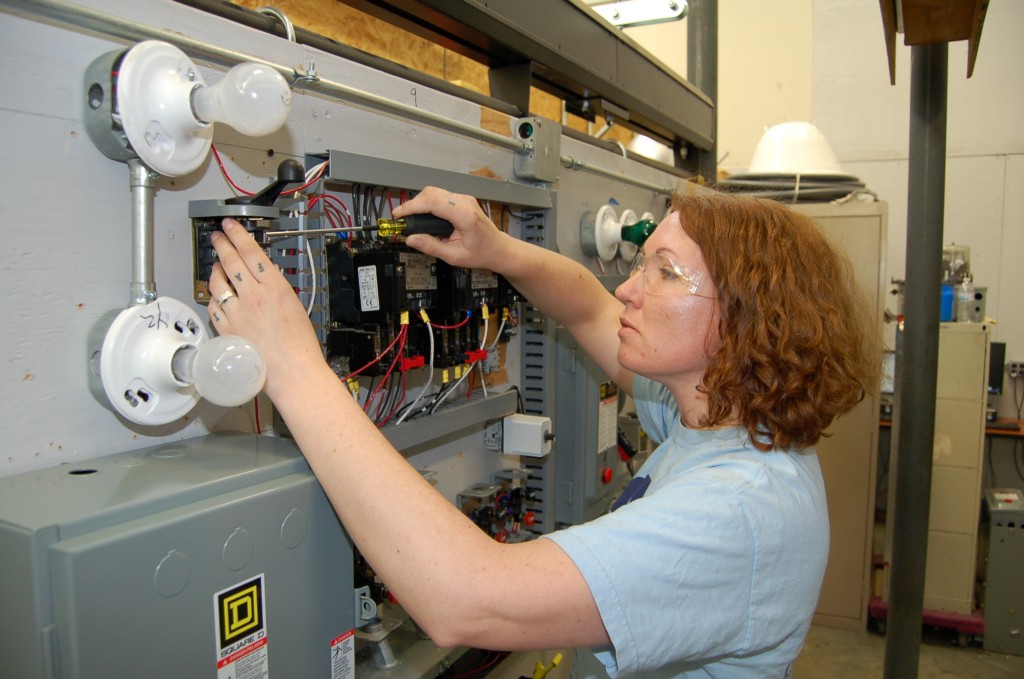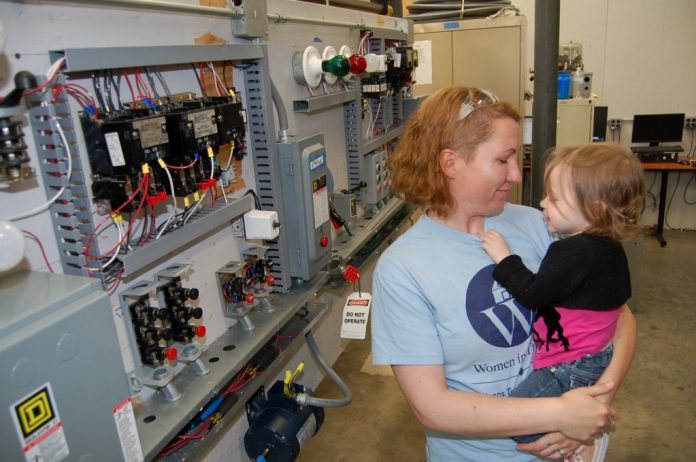DONNA DIPAOLO / FOR THE TIMES
Everyone has their own version of rock bottom. Last summer, Alison Battestelli found hers.
She had recently moved from a homeless shelter into her in-laws’ Oxford Circle home. She was stuck in a dead-end retail job and trying to support her disabled husband as well as their 8-month-old daughter. And she was depressed.
But Battestelli also had an idea. She wanted to reinvent herself, wanted to start a new career. So she went onto the Internet and found a link to the Residential and Commercial Electricity course offered by Orleans Technical College. Six months later, Battestelli landed a lucrative new job as an apprentice high-voltage technician.
March is recognized annually in the United States as Women’s History Month. In conjunction with that observance, the National Association of Women in Construction celebrated March 6 to 12 as Women in Construction Week. As one of the relatively few women in her line of work, the 33-year-old Battestelli has had a lot to celebrate.
“So far, I’ve traveled to Babylon, New York, on Long Island, Reading and Allentown. There’s jobs all over the place,” Battestelli said during an interview with the Northeast Times. “There are women in the office, but I’m the only woman who works in the field. … It’s dirty; there’s always dust. It’s very physical; I get scratches all over. But I’m always learning. I can always test myself.”
She prefers her new tests a lot more than the ones life was presenting her before she decided to enrol at Orleans. A native of Cape May County, she moved to Northeast Philly as a teenager and has worked a variety of entry-level jobs over the last 15 years.
She was a project manager for a commercial sign company for a while and held a lot of retail sales jobs. Years ago, she worked her way into a retail management position, but then got laid off.
“I kept going down the retail management ladder until I was a clerk again,” she said.
Most recently, she was working as a state liquor store clerk, but jobs with benefits are difficult to land from the Liquor Control Board.
Battestelli credits the birth of daughter Imogen, who is now 16 months, with giving her a final motivational boost. Especially with her husband Jim on disability as a result of a major car accident years ago.
“After Imogen was born, I had a purpose,” she said.
She had never attended college, so Battestelli had no prior student debt. She was able to finance the Orleans program through grants, loans and financial aid directly from the school. Picking which course to study was one of her easiest decisions.
As a young girl, she had always tinkered around mechanically with her father. At one point, her family had a bicycle shop down the shore. While in the Navy, her dad was an electrical engineer. Battestelli had always looked up to him. He passed away in 2013.
“I wanted to do a trade because it’s fast paced. It’s six months and you get a certificant and you can go out and get a job,” she said.
Her instructor at Orleans, Joe Dougherty, said that Battestelli showed leadership qualities from the start.
“She had to be at the top of her game. She had to show the boys she belonged,” Dougherty said. “And she became a leader of the room.”
Battestelli admits that she had personal doubts at times, but her family helped her to keep working.
“I told her, ‘You’re a superstar now. And with great power comes great responsibility,’ ” Jim Battestelli said.
Battestelli is still a self-described “girly girl” in many ways, but she’s also a tough customer on the job. She works on a crew that does maintenance on high-voltage units at commercial and industrial properties, like factories, hospitals, schools and prisons. Many large buildings have sub-stations where the power comes in at high voltage, 13,000 volts perhaps. Then transformers reduce the voltage to a level compatible with the machinery in the facility.
“We test (the electrical equipment), clean it and make sure it functions properly,” she said.
There’s a lot of climbing on ladders and roofs, with harnesses, hard hats and safety protection.
When it comes to the battle of the sexes, Battestelli feels she must be understanding of the old boys network without letting anyone take advantage of her.
“Most of the men are polite. For the most part, at first, they were like, ‘Let’s see how she works out before we take her seriously,’ ” Battestelli said. “The older (guys) were cool about it because they have wives and kids and understand. … They’re very masculine. They chew tobacco and listen to country music. You can’t be too sensitive. You have to be thin skinned. The funny thing is I’m a very sensitive person, but I turn it off at work.”
Battestelli hopes that she’ll keep working for many years to come. Her company has a four-year apprenticeship program. After that, she may look into becoming a supervisor or perhaps going into business for herself. In that respect, being a woman could give her an advantage in winning contracts reserved for minority- and women-owned businesses. Otherwise, she’s not trying to prove a point about women.
“It’s not a matter of trying to stand out. It’s just that I have to do what I have to do,” she said. “There’s two steps to it. There’s the decision to do it. And there’s the knowledge that if this is the priority in your life, you have to do it. You have to keep the eyes on the prize.” ••

Got the connection: Alison Battestelli attended Orleans Technical College, and six months later, she landed a well-paying job. Battestelli’s daughter, Imogen, was her motivation. DONNA DIPAOLO / FOR THE TIMES





